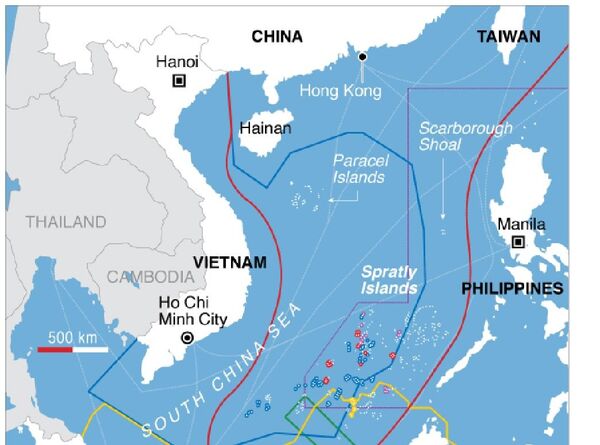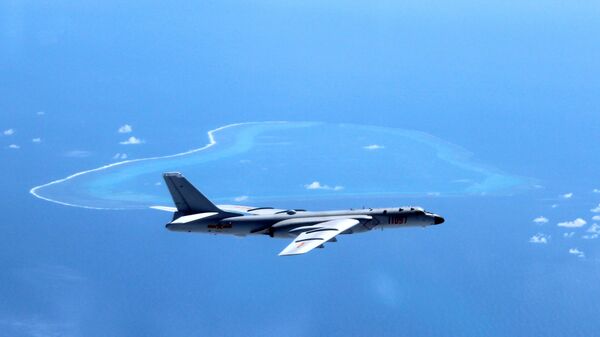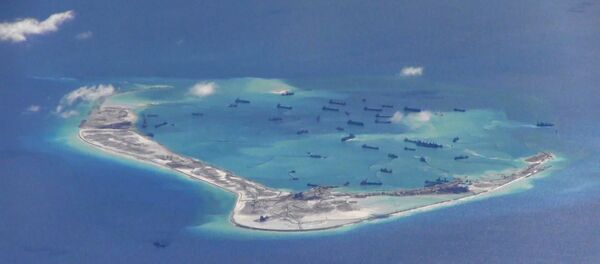Although the ruling issued by the Permanent Court of Arbitration (PCA) in The Hague on the South China Sea has affected Beijing's posture in the region, Beijing has softened up its neighbors through diplomatic means.
"As previously predicted, in practical terms, the verdict has not impacted (at least not yet) China's policy in the South China Sea as the country considered it 'null and void'. Judging by statements made by the Chinese leadership, the development of infrastructure (which includes that of a military nature) on the islands and reefs of the South China Sea will continue," Vladimir Terehov of New Eastern Outlook wrote in his analytical report.
"As the result of the 49th meeting of the Foreign Ministers of the ASEAN member states, a Joint Statement was adopted on 'the maintenance of peace, security, and stability in the region'. The document is written in rather general terms in a sense that it does not mention China and the PCA verdict," he stressed, adding that the statement was received "positively" by Beijing.
This unanimous silence on The Hague South China Sea ruling was interpreted as Beijing's diplomatic victory by the US and Japan.
"China scored a diplomatic victory Monday, avoiding criticism by Southeast Asia's main grouping over its territorial expansion in the South China Sea even though some of the bloc's members are victims of Beijing's actions," Japan's national daily The Mainichi reported on July 25.
"China was able to push through its stance in ASEAN with the help of Cambodia, and to some extent Laos, both of which are close friends of Beijing. ASEAN's guiding principle is to make all statements by consensus, so a veto by Cambodia would have prevented a more stinging rebuke," the media outlet suggested.
Commenting on the issue Victor Sumsky, Director of the ASEAN Center at the Moscow State Institute of International Relations (MGIMO University), noted that the mildly-worded communiqué clearly signals that ASEAN has refused to "commit suicide" despite Washington's pressure.

"The Association of Southeast Asian Nations (ASEAN) has demonstrated its wisdom. Anti-Chinese or pro-American positions would have meant suicide for the organization," Sumsky told Sputnik.
On the other hand, ASEAN nations do not want to jeopardize their longstanding economic ties with Beijing.
"Last year, China's trade with ASEAN countries reached a colossal $472 billion and the parties stand to lose out from any aggravation of the situation in the region," Terehov stresses.
Citing China's Foreign Minister, Wang Yi, Terehov calls attention to the fact that "at the China-ASEAN forum, 80 percent of the time was devoted to the economy and only a small percent to the situation in the South China Sea."
Southeast Asian nations are also interested in participating in the China-led New Silk Road initiative which is likely to bring them tangible benefits.
Russia's stance on the developments in the South China Sea also deserves attention. Russian Foreign Minister Sergei Lavrov has repeatedly stated that Moscow opposes the "internationalization" of the South China Sea dispute. According to the Kremlin, the regional dispute should be solved solely by the parties concerned.
On July 28 Chinese Defense Ministry spokesman Yang Yujun announced Russia and China will hold joint naval drills in the South China Sea in September, stressing that the exercises are "not aimed at third countries."
The announcement has triggered a heated debate in Western media, with experts wondering whether or not Moscow and China will enter disputed waters during the drills.
However, Moscow's decision to hold joint naval exercises with China in the potential regional powder keg is of a symbolic nature, according to Vzglyad columnist Petr Akopov.
While the US-led NATO bloc is raising the stakes in the South China Sea, Russia is "demonstrating its solidarity with China," he believes. However, Moscow is not intending to interfere in the dispute. Its recent move aims to "emphasize that external forces should not influence the settlement of disputes between neighbors," the journalist stressed.




